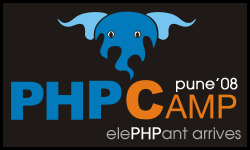What: NASSCOM Product Forum
When: Thursday, 25th September, 10am to 1pm
Where: MCCIA (Hall No.4), A Wing, MCCIA Trade Tower,5th Floor, ICC Complex, Senapati Bapat Road
Fees and Registration: This event is free for all. Please RSVP Paresh Degaonkar at paresh@nasscom.in or call at 91 9850049251
Details:
The NASSCOM Event at Pune slated on Sept 25, 2008 will unveil “NASSCOM Software Product Study” and the announcement of “NASSCOM INTEL Product Connect Initiative”.
The NASSCOM Software Product Business Study presents the findings of our latest research effort focused on the Indian software product business environment. It provides a comprehensive review of the Product Business History, market landscape; highlights the key opportunity areas; identifies enablers for growth and suggests some targeted actions that key stakeholders should undertake to enable the next phase of growth for Indian software product businesses.
The “NASSCOM – INTEL Product Connect Initiative” is a collaboration to contribute to the overall software ecosystem by empowering NASSCOM’s member companies (software vendors) to innovate and develop a commercially viable application for businesses or Consumers. Beginning with strategic planning and insights into Intel’s technology roadmaps, the support continues through product development and application enablement, and the cycle is completed by augmenting your marketing campaigns with downloadable marketing resources and access to the Intel® Business Exchange portal – to enable you to reach new customers worldwide, and gain access, on a selective basis, to the investment wing of Intel.
Who should attend:
- CXOs of Product Companies
- Incubation Centers
- Product Managers
- Product Architects
- Investing Community
- Entrepreneurs
To keep in touch with all interesting tech events happening in Pune, check out the PuneTech calendar.


![Reblog this post [with Zemanta]](http://img.zemanta.com/reblog_e.png?x-id=2068276c-584b-4b16-9179-932af81e7cab)
![Reblog this post [with Zemanta]](http://img.zemanta.com/reblog_e.png?x-id=413e2d5b-e6da-40a7-88f6-1590b7701374)
![Reblog this post [with Zemanta]](http://img.zemanta.com/reblog_b.png?x-id=efd7b70c-4026-423c-aa7e-f2bf768ba7d4)
![Reblog this post [with Zemanta]](http://img.zemanta.com/reblog_e.png?x-id=90f8b6e0-7ea4-445f-8b6e-1b692f2de6fd)
![Reblog this post [with Zemanta]](http://img.zemanta.com/reblog_e.png?x-id=5dd4732a-a3c8-44c9-ace4-20db6fca0b32)